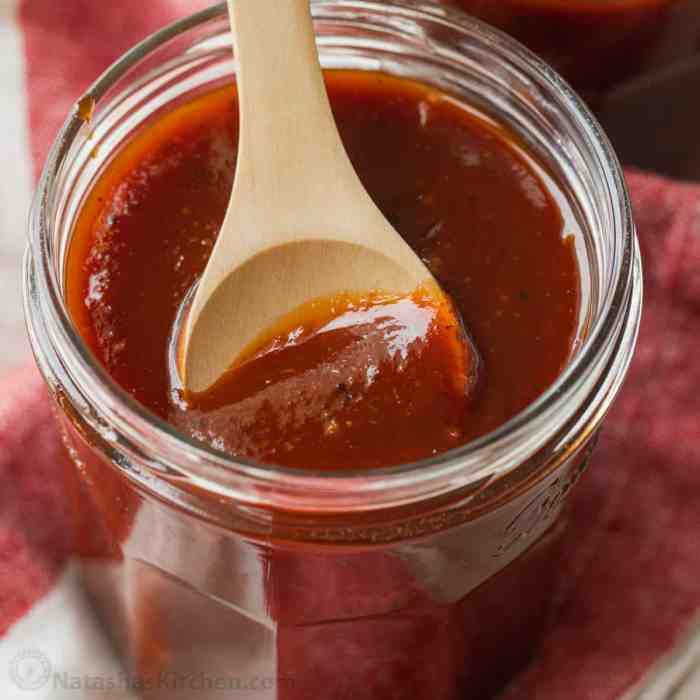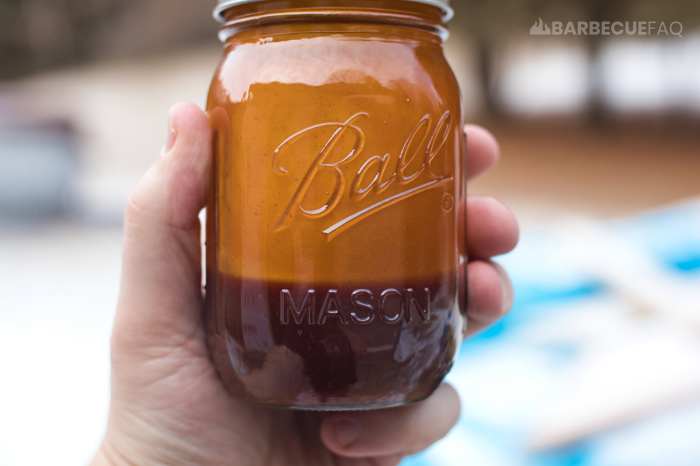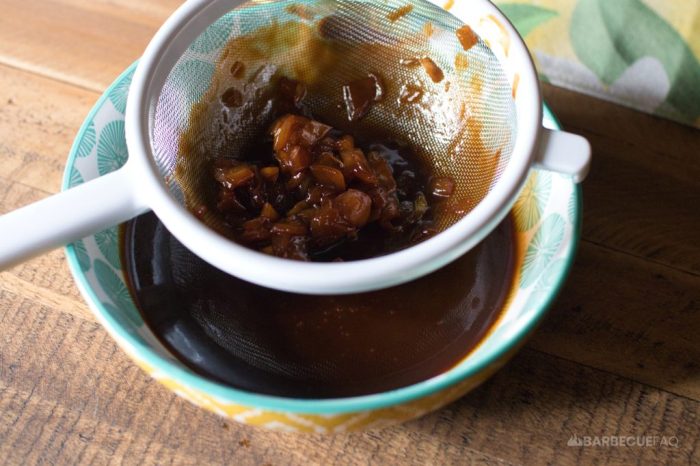BBQ Sauce Recipes From Scratch
Homemade BBQ Sauce: A Flavorful Journey: Bbq Sauce Recipes From Scratch

Source: natashaskitchen.com
Bbq sauce recipes from scratch – Barbecue sauce, a cornerstone of American cuisine, boasts a rich history interwoven with regional traditions and culinary innovation. From its humble beginnings as a simple way to enhance the flavor of smoked meats, it has evolved into a complex and diverse condiment with countless variations. Crafting your own BBQ sauce offers a rewarding experience, allowing for personalized flavor profiles and a deeper understanding of this beloved sauce.
Introduction to Homemade BBQ Sauce

Source: barbecuefaq.com
The history of BBQ sauce is a fascinating blend of cultural influences. Early versions likely consisted of simple vinegars and spices used to tenderize and season meats. Over time, regional variations emerged, reflecting the unique ingredients and culinary preferences of different communities. Making BBQ sauce from scratch provides numerous benefits. You control the ingredients, ensuring freshness and avoiding artificial additives, preservatives, and excessive sugars often found in commercially produced sauces.
The taste is unparalleled; the depth of flavor and nuanced complexity are simply unmatched by store-bought alternatives.
Homemade BBQ sauce surpasses store-bought options in three key ways: Firstly, it offers superior flavor complexity due to the use of fresh, high-quality ingredients. Secondly, you can precisely control the sweetness and spice levels to suit your palate. Finally, making your own sauce allows for complete customization, enabling the creation of unique flavor profiles tailored to your preferences.
The basic ingredients common to most BBQ sauces include tomatoes (or tomato paste), vinegar (often apple cider or white vinegar), sugar (brown sugar is common), and spices such as paprika, garlic powder, onion powder, and black pepper. Many recipes also incorporate molasses, Worcestershire sauce, and mustard for added depth of flavor.
Types of BBQ Sauce
Regional variations in BBQ sauce are a testament to the diverse culinary landscape of the United States. Each region boasts its own unique style, reflecting the readily available ingredients and local preferences. These differences are primarily evident in the balance of sweet, sour, and spicy flavors, as well as the use of key ingredients like vinegar, tomatoes, and molasses.
Carolina-style sauces are typically vinegar-based, with a tangy and slightly spicy profile. Kansas City-style sauces tend to be tomato-based, with a balance of sweet and smoky flavors. Memphis-style sauces are often a blend of tomato and vinegar, offering a more balanced flavor profile. Texas-style sauces, on the other hand, are known for their simplicity, often focusing on just a few key ingredients and showcasing the natural flavors of the meat.
The interplay of vinegar, tomatoes, and molasses significantly impacts the final flavor. Vinegar provides acidity and tang, tomatoes add sweetness and body, and molasses contributes a rich, deep sweetness and a subtle bitterness. The proportions of these ingredients vary considerably across regional styles, resulting in distinct flavor profiles.
| Region | Primary Ingredients | Sweetness Level | Flavor Profile |
|---|---|---|---|
| Carolina | Vinegar, spices | Low | Tangy, spicy |
| Kansas City | Tomatoes, brown sugar, molasses | Medium-High | Sweet, smoky |
| Memphis | Tomatoes, vinegar, spices | Medium | Balanced, slightly sweet |
| Texas | Vinegar, spices (minimal sugar) | Low | Simple, savory |
Basic BBQ Sauce Recipe
This recipe provides a foundation for creating a delicious tomato-based BBQ sauce. The steps are straightforward, and the resulting sauce is versatile and adaptable to various flavor preferences.
Ingredients: 2 cups ketchup, 1 cup apple cider vinegar, ½ cup brown sugar, ¼ cup Worcestershire sauce, 2 tablespoons Dijon mustard, 1 tablespoon smoked paprika, 1 teaspoon garlic powder, 1 teaspoon onion powder, ½ teaspoon black pepper.
Instructions:
Crafting BBQ sauce from scratch allows for complete control over flavor profiles, from smoky to sweet. This meticulous approach contrasts with simpler recipes, such as a baby pasta sauce recipe , which prioritizes gentle ingredients and easy digestibility. However, both endeavors share the common thread of transforming basic ingredients into delicious, homemade sauces.
- Combine all ingredients in a medium saucepan.
- Bring to a simmer over medium heat, stirring occasionally.
- Reduce heat to low and simmer for 30-45 minutes, stirring occasionally, until the sauce has thickened to your desired consistency.
- Remove from heat and let cool completely before using or storing.
To adjust consistency, simmer longer for a thicker sauce or add a tablespoon of water or vinegar for a thinner sauce. You can also blend the sauce for a smoother texture.
Variations and Flavor Profiles

Source: barbecuefaq.com
The basic BBQ sauce recipe can be easily customized to create a wide range of flavor profiles. Adding different spices, fruits, or peppers can dramatically alter the final taste. The use of alternative sweeteners also impacts the overall sweetness and depth of flavor.
- Smoky BBQ Sauce: Add 1-2 tablespoons of liquid smoke to the basic recipe for a pronounced smoky flavor. Consider adding chipotle powder for an extra layer of smoky heat.
- Sweet BBQ Sauce: Increase the amount of brown sugar to 1 cup, and add ½ cup of honey or maple syrup for a richer, more intense sweetness. A touch of bourbon or apple juice can add complexity.
- Spicy BBQ Sauce: Add 1-2 finely chopped jalapeños or a tablespoon of your favorite hot sauce to the basic recipe for a fiery kick. A pinch of cayenne pepper can add subtle heat without overpowering the other flavors.
Advanced Techniques and Tips, Bbq sauce recipes from scratch
Achieving a truly exceptional BBQ sauce requires attention to detail and a few advanced techniques. Understanding ingredient ratios and cooking times is crucial for achieving the desired flavor and consistency. Proper storage and preservation methods will ensure the longevity of your homemade creation.
To achieve a smoky flavor without a smoker, you can use liquid smoke, smoked paprika, or chipotle peppers. Avoid scorching the sauce by using low heat and stirring frequently. Maintaining the correct balance of ingredients is vital; too much vinegar will make it too sour, while too much sugar will result in an overly sweet sauce. Proper cooking times ensure the flavors meld and the sauce thickens adequately.
Store homemade BBQ sauce in airtight containers in the refrigerator for up to 2 weeks or freeze for longer storage.
Serving Suggestions
Homemade BBQ sauce is incredibly versatile and pairs well with a wide array of foods. It can be used as a marinade, glaze, dipping sauce, or even as a component in other dishes. Its applications are only limited by your imagination.
| Food Pairing | Recommended BBQ Sauce Type | Serving Suggestion | Notes |
|---|---|---|---|
| Pulled Pork | Carolina, Kansas City | Use as a topping or dipping sauce. | The tanginess of Carolina or sweetness of Kansas City complements the pork well. |
| Chicken Wings | Spicy, Sweet | Use as a glaze while grilling or baking. | The sweetness and spice enhance the chicken flavor. |
| Grilled Vegetables | Basic Tomato-Based | Drizzle over grilled vegetables after cooking. | The basic sauce complements the natural flavors of the vegetables. |
| Burgers | Any type | Use as a topping or condiment. | Choose a sauce that suits your personal preference. |
Clarifying Questions
How long does homemade BBQ sauce last?
Properly stored in the refrigerator, homemade BBQ sauce typically lasts for 1-2 weeks.
Can I freeze homemade BBQ sauce?
Yes, you can freeze BBQ sauce for up to 3 months. Allow it to thaw completely in the refrigerator before using.
What can I do if my BBQ sauce is too thick or too thin?
Too thick? Add a little water or vinegar. Too thin? Simmer uncovered to reduce the liquid.
What are some good substitutes for molasses?
Brown sugar or maple syrup can be used as substitutes for molasses, but they will alter the flavor slightly.




















